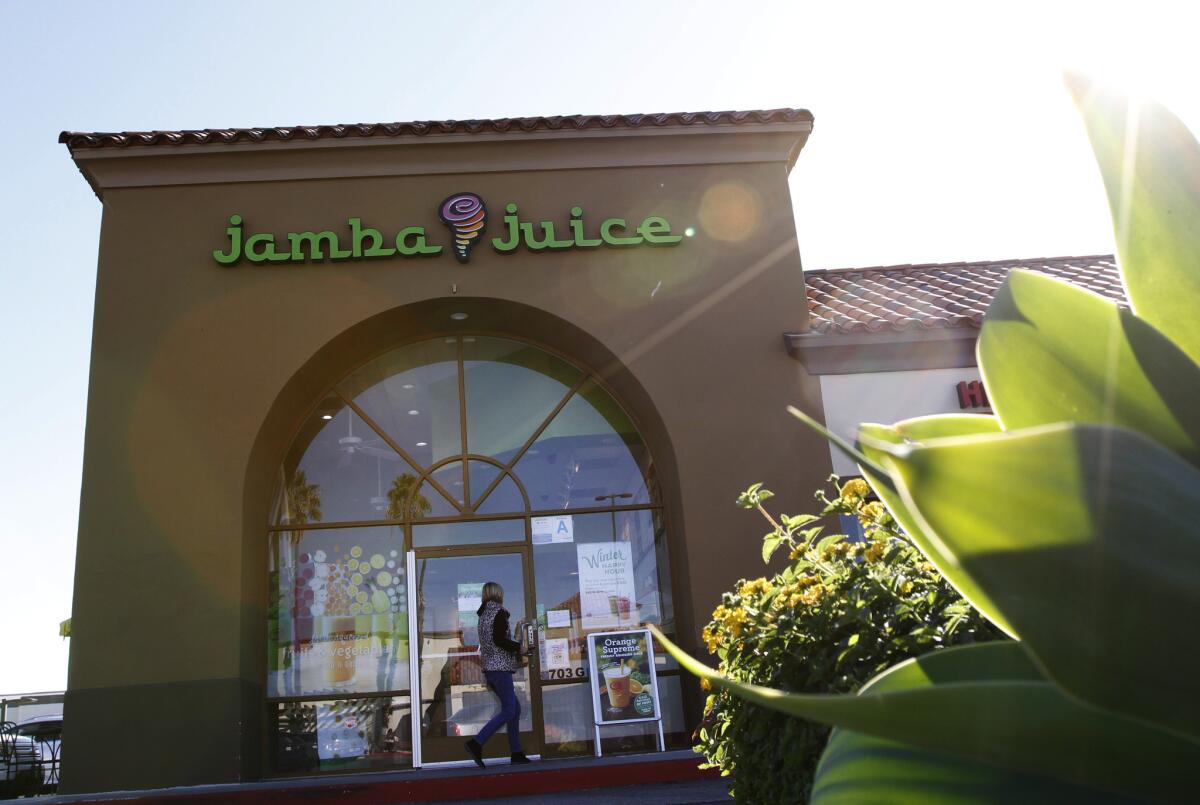Jamba Juice moving to Texas from Bay Area

- Share via
More than 25 years after the first Jamba Juice shop opened in San Luis Obispo, the owner of the smoothie company announced plans to move its headquarters from California to Texas within eight months.
Jamba Inc. will close its Emeryville, Calif., office and establish a new corporate home in Frisco, Texas, about 30 miles north of Dallas. In a statement, Chief Executive David Pace said Jamba was looking for places that had “competitive operating costs,” access to “skilled restaurant talent” and an “attractive cost of living,” along with a central location for further expansion.
“The state of Texas meets all of these criteria and Frisco is a community committed to healthy living that aligns closely with our overall mission,” Pace said.
The company’s lease in Emeryville is set to expire at the end of the year.
The move will affect about 120 employees in Jamba’s Emeryville location. After the company moves, Jamba said it expects to employ about 100 employees in Frisco, a mix of San Francisco Bay Area transplants and newly hired Texas workers.
As of December, Jamba had 818 stores across the United States. The publicly traded company said it has 1,000 employees in California alone. There are more than 5,000 workers at franchise locations across the state.
Jamba will follow longtime Southern California burger chain Carl’s Jr. in moving its corporate home out of the Golden State. In March, CKE Restaurants Holdings Inc., which owns Carl’s Jr. and St. Louis-based Hardee’s, said it would move its Carpenteria headquarters to Franklin, Tenn., next year. The company said the move was intended to consolidate the two chains’ headquarters in one location.
As a whole, the restaurant sector is struggling to deal with higher labor costs. If those chains can’t pass those costs on to consumers, which many have been unable to do, they have to reduce costs in other parts of the business, said Nick Setyan, senior vice president of equity research at Wedbush Securities.
One option is re-franchising, a model that Jamba and Carl’s Jr. have embraced over the last few years. As of March, there were 68 company-owned and operated Jamba Juices and 752 franchised stores in the U.S.
“You’re seeing them re-franchise in order to have a lower cost and a more predictable operating model,” Setyan said. “If you’re trying to cut costs, then you have to look at it across the entire business and look at your headquarters. If that results in lower costs, that’s always on the table.”
Thanks in part to the success of the technology industry, labor and real estate in the Bay Area come at a high price.
Staying in the Bay Area can be lucrative and valuable for companies in the innovation sector since employees in the area tend to be more creative and productive, said Enrico Moretti, an economics professor at UC Berkeley.
“They cost more, but they generate more,” he said.
But for companies in more traditional industries, such as Jamba, Moretti said the Bay Area’s benefits may not be worth the expense.
Jamba is just the latest California company to announce plans to relocate to Texas.
In 2014, Toyota Motor Corp. said it would move its North American headquarters to Plano, Texas, from Torrance over the next three years.
That same year, longtime Los Angeles-based energy giant Occidental Petroleum announced that it was relocating its headquarters to Houston and would spin off its California assets into a separate company.
And nearly two dozen Bay Area tech companies have made the move to Texas since 2014, according to the San Francisco Chronicle.
Former Texas Gov. Rick Perry once touted the Texas Enterprise Fund and other cash incentives, along with local property tax breaks, as important for enticing companies to move. Toyota was offered a $40-million grant when the automaker announced its move, though the company said incentives had little, if anything, to do with the decision.
Jamba was also offered a Texas Enterprise Fund grant of $800,000. The company said incentives were not a driver in the move to Texas.
Other factors, such as the low corporate tax rate and no personal income tax, could also be advantages for companies looking to move to the Lone Star State.
Lower corporate taxes mean higher company profits, but possibly more important is the income tax aspect, Moretti said. Without raising wages, employees can see an increase in their pay, he said.
More to Read
Inside the business of entertainment
The Wide Shot brings you news, analysis and insights on everything from streaming wars to production — and what it all means for the future.
You may occasionally receive promotional content from the Los Angeles Times.











